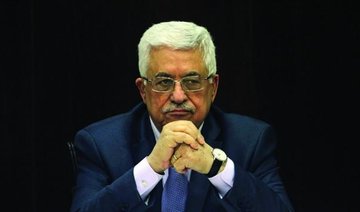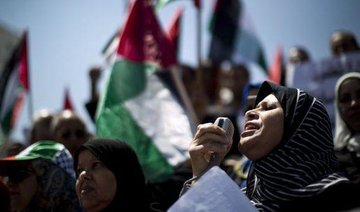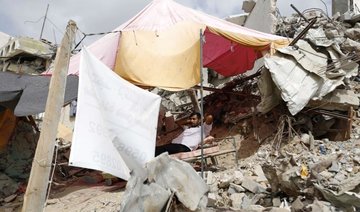AMMAN/GAZA/CAIRO: Palestinian President Mahmoud Abbas will visit Gaza in the next few weeks, once all the arrangements for the return of power to the Ramallah-based government are complete, a senior Palestinian source told Arab News.
Abbas “will be in Gaza in less than a month,” Zakaria Al-Agha, a senior Fatah leader in Gaza, told Agence France-Presse (AFP) after a breakthrough in reconciliation talks in Cairo.
Saed Karim, head of the Palestinian Art Forum in Gaza, said people in the territory want real unity.
“We want a president for all Palestinians… not a leader for one group,” he told Arab News. “This means he needs to end his political career by treating all Palestinians the same way and without discrimination.”
Nida Marwan, an unemployed university graduate, said she hopes Abbas will put an end to Gaza’s plight.
“There are many who aren’t able to find work with either Hamas or Fatah, so they’re stepped on by all because they don’t belong to one group or the other,” she told Arab News.
Respected Gazan intellectual and author Juma Younis said before Abbas visits the territory, he needs to end all punitive measures against its people, especially regarding electricity and water. “People are tired of paying two authorities,” Younis told Arab News.
Ali Madi, a private-sector employee, told Arab News: “We want Abbas to open a new page with his people, especially those of us in Gaza, so we can forgive him for all the pain we suffered due to the siege. We hope he pays attention to the issues of heath, borders, reconstruction and unemployment.”
Hassan Douhan, a senior editor for Al-Hayat Al-Jadida daily, said Gazans are looking forward to the visit of Abbas as it will represent a new phase.
“The visit will have implications that affect the daily lives of our people. It will allow legitimacy and the rule of law,” Douhan told Arab News.
He expects Abbas to give “a historic talk to a huge crowd. People will be happy to be reunited with the legitimate government of the Palestinian Authority.”
Radi Al-Mileh, a photographer with the official Palestinian news agency WAFA, told Arab News: “Abbas is the leader of all Palestinians, so his arrival in Gaza isn’t a visit, but a realization of the unity of our people and the end of this ugly division.”
Earlier, Hamas and Fatah signed a reconciliation deal after Hamas agreed to hand over administrative control of Gaza, including the key Rafah border crossing.
The deal brokered by Egypt bridges a bitter gulf between the Western-backed mainstream Fatah party and Hamas, said Reuters.
Palestinian unity could also bolster Abbas’s hand in any revival of talks on a Palestinian state in Israeli occupied territory. Internal Palestinian strife has been a major obstacle to peacemaking, with Hamas having fought three wars with Israel since 2008 and continuing to call for its destruction.
Hamas’ agreement to transfer administrative powers in Gaza to a Fatah-backed government marked a major reversal, prompted partly by its fears of financial and political isolation after its main patron and donor, Qatar, plunged in June into a major diplomatic dispute with key allies like Saudi Arabia. They accuse Qatar of supporting militants, which it denies.
The Palestinian accord was met warily in Israel.
For Israel to accept it, said one government official, the deal must abide by previous international agreements and terms set out by the Quartet of Middle East peace mediators — including the recognition of Israel and Hamas giving up its weapons.
“Israel will examine developments in the field and act accordingly,” according to the official, who spoke on condition of anonymity.
Thousands of Palestinians took to the streets across Gaza on Thursday in celebration of the unity pact, with loudspeakers on open cars blasting national songs, youths dancing and hugging and many waving Palestine and Egyptian flags.
Egypt helped mediate several previous attempts to reconcile the two movements and form a power-sharing unity government in Gaza and the West Bank, where Abbas and the Fatah-led Palestinian Authority (PA) are based.
“The legitimate government, the government of consensus, will return according to its responsibilities and according to the law,” Fatah delegation chief Azzam Al-Ahmed said at the signing ceremony in Cairo.
He said the unity government would “run all institutions without exception,” including all border crossings with Israel and in Rafah, Gaza’s only access point with Egypt.
The agreement calls for Abbas’ presidential guard to assume the responsibility of the Rafah crossing on Nov. 1, and for the full handover of administrative control of Gaza to the unity government to be completed by Dec. 1.
Analysts said the deal is more likely to stick than earlier ones given Hamas’s growing isolation and realization of how hard Gaza, its economy hobbled by border blockades and infrastructure shattered by wars with Israel, was to govern and rebuild.
“We in Hamas are determined and are serious this time and just like all other times ... We have dissolved the administrative committee (shadow government)...We have opened the door to reaching this reconciliation,” Saleh Arouri, the head of Hamas negotiators in Cairo, said after the signing ceremony.
Delegations from the two rivals have been in talks in Cairo this week to work out the details of the administrative handover, including security in Gaza and at border crossings.
Key was the Rafah crossing, once the gateway to the world for the 2 million people packed into the small impoverished territory. Fatah said it should be run by the presidential guards, supervised by the EU border agency, EUBAM, instead of the Hamas-linked employees now deployed.
“EUBAM Rafah maintains readiness to redeploy to the Rafah crossing point when the security and political situations will allow,” said Mohammed Al-Saadi, press officer for the EU Coordinating Office for Palestinian Police Support.
Any decision on EUBAM deployment would be taken in conjunction with the Palestinian Authority and Israel’s government, he said in a statement.
Some 3,000 Fatah security officers are to join the Gaza police force. But Hamas would remain the most powerful armed Palestinian faction, with around 25,000 well-armed militants.
Both rivals hope the deal’s proposed deployment of security personnel from the PA to Gaza’s borders will encourage Egypt and Israel to lift tight restrictions at frontier crossings — a step urgently needed to help Gaza revive a war-shattered economy.
Another major issue in talks on the deal was the fate of 40,000 to 50,000 employees Hamas has hired in Gaza since 2007, a thorny point that helped crash the 2014 unity accord.
Under the deal, these employees will receive 50 percent of what their PA salary would be — or equivalent to what they are paid now by Hamas — pending vetting of their professional qualifications.
Hamas and Fatah are also debating a potential date for presidential and legislative elections and reforms of the Palestine Liberation Organization, which is in charge of long-stalled peace efforts with Israel.
The last Palestinian legislative election was in 2006, when Hamas scored a surprise victory. That sparked the political rupture between Hamas and Fatah, which eventually led to their short civil war in Gaza.
Buoyed by unity deal, Abbas to visit Gaza in the next few weeks: Source
Buoyed by unity deal, Abbas to visit Gaza in the next few weeks: Source

UAE launches 4th phase of Gaza water supply project

- The UAE-supported project focuses on maintaining and restoring central wells across Gaza’s municipalities, ensuring the continuity of essential water services
DUBAI: The UAE has launched the fourth phase of its humanitarian water supply initiative in the Gaza Strip this week.
The project is part of the ongoing “Operation Chivalrous Knight 3,” aimed at alleviating the suffering of Palestinian civilians amid a worsening humanitarian crisis.
The UAE-supported project focuses on maintaining and restoring central wells across Gaza’s municipalities, ensuring the continuity of essential water services.
This latest phase includes the repair of 28 non-operational wells across several governorates, a move expected to benefit nearly 700,000 residents.
Sharif Al-Nayrab, media director for Operation Chivalrous Knight 3, praised the long-standing support of Emirati humanitarian organizations for Gaza’s critical sectors.
“This initiative reflects the UAE’s firm commitment to supporting the Palestinian people, especially during times of acute need,” he said.
This is the fourth water-related project implemented under the UAE initiative.
Earlier phases included daily distribution of water via tankers, the drilling of emergency wells along southern coastal areas and the construction of submersible wells to increase supply.
Operation Chivalrous Knight 3 has provided critical relief and development efforts across Gaza, delivering food, health and utility support.
Israeli army says body of soldier missing for 43 years found in ‘heart of Syria’

JERUSALEM: The Israeli army said Sunday that the body of a soldier missing for 43 years had been found in the “heart of Syria” and repatriated in a special operation with the Mossad intelligence agency.
“In a special operation led by the IDF (military) and Mossad, the body of Sgt. First Class Tzvika Feldman was found in the heart of Syria and brought back to Israel,” the army said in a statement.
Feldman went missing along with two other soldiers in the 1982 battle of Sultan Yacoub that pitted Israeli and Syrian forces against each other in the Bekaa region of eastern Lebanon, near the border with Syria.
In a separate statement, Israeli Prime Minister Benjamin Netanyahu praised the efforts to locate Feldman’s body, noting that the search for him and his comrades — Zachariah Baumel and Yehuda Katz — had been ongoing for decades.
“Approximately six years ago, we returned for a Jewish burial, Sgt. First Class Zechariah Baumel; today we have returned Tzvika, of blessed memory. We will not cease our efforts to return Sgt. First Class Yehuda Katz, who is also an MIA from the same battle,” Netanyahu’s statement said, adding that the prime minister had personally notified Feldman’s parents.
The army statement said that Feldman’s body had been identified by the Genomic Identification Center for Fallen Soldiers of the Military Rabbinate but gave little details of how his remains were located deep inside Syria.
“The return of Sgt. Feldman was made possible through a complex and covert operation, enabled by precise intelligence and the use of operational capabilities that demonstrated ingenuity and courage,” the statement said.
“This concludes an extensive intelligence and operational effort that spanned more than four decades, involving close cooperation between the POW/MIA Coordinators in the Prime Minister’s Office, intelligence and operational units within the Mossad and IDF Intelligence Directorate, along with the Shin Bet and the IDF Human Resources Directorate,” the army said.
Iran, US to hold 4th round of talks as enrichment concerns grow

- Iran FM says hopes fourth round of talks with US reaches ‘decisive point’
- Araghchi said Tehran's right to enrich uranium was ‘non-negotiable’
MUSCAT: Iran and the United States are set to attend a fourth round of talks over Tehran’s nuclear program on Sunday, as US officials have voiced increasing opposition to Iranian enrichment.
The negotiations, mediated by Oman and held in its capital Muscat, follow earlier rounds that began nearly a month ago, marking the highest-level contact between the two foes since Washington withdrew from a landmark nuclear deal in 2018, during President Donald Trump’s first term.
Both sides have reported progress after previous talks, but there have been some delays and disagreements over Iran’s right to enrich uranium, which Tehran says is “non-negotiable” but a US envoy has called a “red line.”
Iran’s Foreign Minister Abbas Araghchi said ahead of Sunday’s meeting that “the negotiations are progressing and, naturally, the further we go, the more consultations and considerations we need” and the more time is required “to review the issues raised.”
The fourth round was initially set to take place on May 3 but has been rescheduled. Mediator Oman cited “logistical reasons” for the delay, which was announced after the United States had imposed new sanctions on Iran.
Western countries, including the United States, have long accused Iran of seeking to acquire atomic weapons, a claim Tehran has consistently denied, insisting that its nuclear program is for peaceful purposes.
Iran currently enriches uranium to 60-percent purity — far above the 3.67-percent limit set in the 2015 deal with the United States and other world powers, but below the 90 percent needed for weapons-grade material.
US Middle East envoy Steve Witkoff, who has led Washington’s delegation to the Omani-mediated talks, said in a Friday interview that Iran’s “enrichment facilities have to be dismantled.”
“That’s our red line. No enrichment,” he told US right-wing outlet Breitbart News, after initially suggesting flexibility on Tehran maintaining low-level enrichment of uranium for civilian purposes.
Witkoff said that if the talks “are not productive... they won’t continue and we’ll have to take a different route.”
Trump has said he wanted “total verification” that Iran’s contested nuclear work is shut down, and Secretary of State Marco Rubio has insisted that Tehran give up all uranium enrichment.
Araghchi, Tehran’s chief negotiator in previous rounds, has repeatedly defended Iran’s right to enrich uranium.
NUCLEAR DEAL
Iran adhered to the 2015 agreement for a year after Washington’s withdrawal before beginning to roll back its compliance.
Since returning to office in January, Trump has revived his “maximum pressure” approach against Tehran, while backing nuclear diplomacy but warning of potential military action if it fails.
The talks are taking place amid renewed scrutiny of key aspects of Tehran’s nuclear program, particularly its stockpile of enriched uranium and the pace of its enrichment activities.
European governments are weighing whether to trigger the “snapback” mechanism under the 2015 deal, which would reinstate UN sanctions in response to Iranian non-compliance — an option that expires in October.
Israel’s Prime Minister Benjamin Netanyahu, who opposes the Iran-US talks, has called for Tehran’s nuclear facilities to be dismantled and for its ballistic missile program to be stopped as part of any credible deal.
Tehran has insisted that the talks be solely focused on the nuclear issue and the lifting of sanctions, ruling out negotiations on military capabilities.
Foreign ministry spokesman Esmaeil Baqaei said that Iran’s delegation “consists of the experts and specialists needed at this stage of the talks, serving the highest interests of our country.”
Sunday’s meeting comes days ahead of a regional tour by Trump, which will take him to Qatar, the United Arab Emirates and Saudi Arabia.
UAE exempts Sudanese nationals from residency, visa fines

- The authority clarified that this decision takes effect on May 19, 2025
DUBAI: The UAE announced on Saturday that Sudanese nationals would be exempt from paying outstanding residency or visa fines.
A statement released by the Federal Authority for Identity, Citizenship, Customs & Port Security said: “The decision aligns with the UAE’s long-standing commitment to supporting brotherly nations and offering humanitarian aid during crises.”
The move underlines the country’s role in promoting humanity and peace, it added.
The decision will come into effect on May 19 and remain valid until the end of 2025.
Sudanese nationals with outstanding fines can regularize their status and submit renewal applications via the ICP’s official digital platforms. Any fines incurred will be waived.
Israeli strikes on Gaza kill 10 people, mostly women and children

- Two of the strikes hit tents in the southern city of Khan Younis, each killing two children and their parents
- Israel has sealed Gaza off from all imports, including food, medicine and emergency shelter, for over 10 weeks
DEIR AL-BALAH, Gaza Strip: Israeli strikes overnight and into Sunday killed 10 people in the Gaza Strip, mostly women and children, according to local health officials.
Two of the strikes hit tents in the southern city of Khan Younis, each killing two children and their parents. Other strikes killed a child and a man riding a bicycle, according to Nasser Hospital, which received the bodies from all the strikes.
Israel has sealed Gaza off from all imports, including food, medicine and emergency shelter, for over 10 weeks in what it says is a pressure tactic aimed at forcing Hamas to release hostages. Israel resumed its offensive in March, shattering a ceasefire that had facilitated the release of more than 30 hostages.
Aid groups say food supplies are running low and hunger is widespread.
The Israeli military says it only targets militants and tries to avoid harming civilians. It blames Hamas for civilian deaths in the 19-month-old war because the militants are embedded in densely populated areas. There was no immediate Israeli comment on the latest strikes.
US President Donald Trump, whose administration has voiced full support for Israel’s actions, is set to visit Saudi Arabia, Qatar and the United Arab Emirates this week in a regional tour that will not include Israel.
The war began when Hamas-led militants attacked southern Israel on Oct. 7, 2023, killing some 1,200 people, mostly civilians, and taking 251 hostage. Fifty-nine hostages are still inside Gaza, around a third of them believed to be alive, after most of the rest were released in ceasefire agreements or other deals.
Israel’s offensive has killed over 52,000 Palestinians, mostly women and children, according to Gaza’s Health Ministry, which does not say how many of the dead were combatants or civilians. The offensive has destroyed vast areas of the territory and displaced some 90 percent of its population of around 2 million.






















